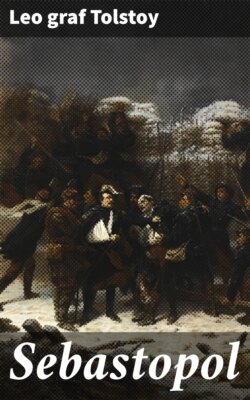Читать книгу Sebastopol - Leo Graf Tolstoy - Страница 6
На сайте Литреса книга снята с продажи.
IV.
ОглавлениеTable of Contents
Prince Galtzine, Lieutenant-colonel Neferdorf, and Praskoukine—whom nobody had invited, and with whom no one chatted, but who followed them just the same—left the boulevard to go and drink tea at Kalouguine’s quarters.
“Finish your story about Vaska Mendel,” said Kalouguine.
Having thrown off his cloak, he was sitting beside the window in a stuffed easy-chair, and unbuttoned the collar of his well-starched, fine Dutch linen shirt.
“How did he get married again?”
“It’s worth any amount of money, I tell you! There was a time when there was nothing else talked about at Petersburg,” replied Prince Galtzine, laughingly.
He left the piano where he had been sitting, and drew near the window.
“It’s worth any amount of money! I know all the details—”
And gayly and wittily he set about relating the story of an amorous intrigue, which we will pass over in silence because it offers us little interest. The striking thing about these gentlemen was, that one of them seated in the window, another at the piano, and a third on a chair with his legs doubled up, seemed to be quite different men from what they were a moment before on the boulevard. No more conceit, no more of this ridiculous affectation towards the infantry officers. Here between themselves they showed out what they were—good fellows, gay, and in high spirits. Their conversation continued upon their comrades and their acquaintances in Petersburg.
“And Maslovsky?”
“Which one—the uhlan or the horse-guardsman?”
“I know them both. In my time the horse-guardsman was only a boy just out of school. And the oldest, is he a captain?”
“Oh yes, for a long time.”
“Is he always with his Bohemian girl?”
“No, he left her—”
And the talk went on in this tone.
Prince Galtzine sang in a charming manner a gypsy song, accompanying himself on the piano. Praskoukine, without being asked, sang second, and so well too that, to his great delight, they begged him to do it again.
A servant brought in tea, cream, and rusks on a silver tray.
“Give some to the prince,” said Kalouguine.
“Isn’t it strange to think,” said Galtzine, drinking his glass of tea near the window, “that we are here in a besieged city, that we have a piano, tea with cream, and all this in lodgings which I would be glad to live in at Petersburg?”
“If we didn’t even have that,” said the old lieutenant-colonel, always discontented, “existence would be intolerable. This continual expectation of something, or this seeing people killed every day without stopping, and this living in the mud without the least comfort—”
“But our infantry officers,” interrupted Kalouguine, “those who live in the bastion with the soldiers, and share their soup with them in the bomb-proof, how do they get on?”
“How do they get on? They don’t change their linen, to be sure, for ten days at a time, but they are astonishing fellows, true heroes!”
Just at this moment an infantry officer entered the room.
“I—I have received an order—to go to general—to his Excellency, from General N——” he said, timidly saluting.
Kalouguine rose, and without returning the salute of the new-comer, without inviting him to be seated, begged him with cruel politeness and an official smile to wait a while; then he went on talking in French with Galtzine, without paying the slightest attention to the poor officer, who stood in the middle of the room, and did not know what to do with himself.
“I have been sent on an important matter,” he said at last, after a moment of silence.
“If that is so, be kind enough to follow me.” Kalouguine threw on his cloak and turned towards the door. An instant later he came back from the general’s room.
“Well, gentlemen, I believe they are going to make it warm to-night.”
“Ah! what—a sortie?” they all asked together.
“I don’t know, you will see yourselves,” he replied, with an enigmatic smile.
“My chief is in the bastion, I must go there,” said Praskoukine, putting on his sword.
No one replied; he ought to know what he had to do. Praskoukine and Neferdorf went out to go to their posts.
“Good-by, gentlemen, au revoir! we will meet again to-night,” cried Kalouguine through the window, while they set out at a rapid trot, bending over the pommels of their Cossack saddles. The sound of their horses’ shoes quickly died away in the dark street.
“Come, tell me, will there really be something going on to-night?” said Galtzine, leaning on the window-sill near Kalouguine, whence they were watching the shells rising over the bastions.
“I can tell you, you alone. You have been in the bastions, haven’t you?”
